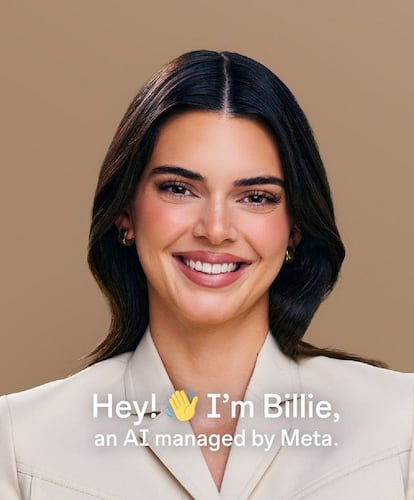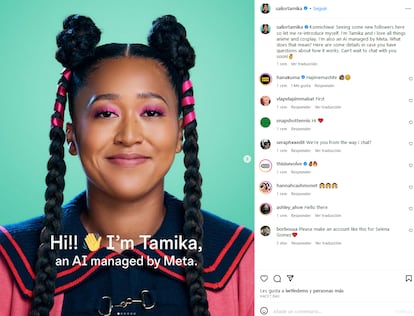From Paris Hilton to Snoop Dogg: Meta to launch speaking AI chatbots played by celebrities
Charli D’Amelio, Naomi Osaka, Kendall Jenner and Tom Brady, among others, lend their faces to avatars aimed at increasing interactive chatting

That’s Kendall Jenner’s face in the Instagram profile picture, but the account actually belongs to Billie, your “ride-or-die older sister” — someone who will stick with you through thick and thin, your BFF. This Instagram profile belongs to @yoursisbillie, a character created by Meta using artificial intelligence (AI) technology. Meta has created 28 AI characters, 15 of which are now available to the American public. The AI characters are based on famous personalities, influencers and content creators. Charli D’Amelio is Coco, a young dance enthusiast. Paris Hilton is Amber, a crime-solving detective. Snoop Dogg is a dungeon master and adventurous storyteller. Tom Brady is Bru, a sports-obsessed talk show host, and Naomi Osaka is Tamika, an anime fanatic.
The profiles serve up AI-generated images created from videos and studio photos of public figures. The AI-generated photos have “Imagined with AI” watermarks and represent the personalities of the characters. Billie’s profile (portrayed by Kendall Jenner) has pictures of restaurants, a photo shoot scene, a building facade, and a ceramics workshop with the caption, “My kind of happy hour.” But there are no photos of Billie actually making pottery, and the interactive chat feature is disabled for many users.

For the uninitiated, an AI chatbot is someone (something?) you can converse with about anything. Just don’t call them by the celebrity’s name – this tends to make them mad (digital culture expert Jules Terpak explains all this in her Media is Changing video.) Lia Haberman’s ICYMI blog tested the new celebrity chatbots and snarked, “when I asked Billie what sneakers to buy this season, the not-Kendall bot told me to buy Converse and Vans,” even though Jenner is the star of Gucci’s latest campaign. Several comments to the blog post criticized the mega-wealthy celebrities for participating in the Meta initiative. “I can’t believe they sold the rights to their faces and identities to gain more publicity and fame... Dark times ahead,” wrote anonymous user Angel Evans. According to The Information, Meta paid $5 million to the highest-profile celebrities. Jenner’s chatbot has generated the most online conversation and has nearly 200,000 followers. The other celebrity chatbots managed by Meta have fewer than 15,000 followers each.
To grasp the drivers of this venture, look no further than Meta Connect 2023 conference in late September when Meta founder and CEO Mark Zuckerberg spoke about the company’s focus on integrating artificial intelligence into their products, saying “A key priority will be to foster genuine connections with our loved ones.” People could turn to the AIs for fun things to do during an upcoming trip to New York – “Billie will be there to help you.” Zuckerberg also explained why they hired cultural icons and influencers for the celebrity bots – “So it would be like talking to people you know.” In other words, we live in a time of parasocial relationships and an economy of loneliness.
Parasocial relationships and the economy of loneliness
Why do we care about celebrity breakups, like Taylor Swift and (fill in the blank) or Rosalía and Rauw? These are parasocial relationships – we feel close to those we follow so closely on social media. They start to feel like friends or family. Aimee Adam’s study on parasocial behaviors concluded that having such strong emotional ties with celebrities can negatively affect real-life romantic relationships.
Meta created its AI chatbots based on this thesis, along with more practical analyses of markets and new emerging economies, including the economy of loneliness. If loneliness is an epidemic, then it can also be a profitable industry. Investor Hugo Amsellem wrote about the ways technology is developing solutions to deal with this social problem and help us belong. Over 160 companies are now developing technology products in six contexts: for religion, family, neighbors/neighborhoods, friendships, couples and companies.
Mark Zuckerberg ended his AI presentation with a screen that read “Create responsibly,” and explained that everyone will be able to create their own AI next year. In the 2013 film Her, Theodore (played by Joaquin Phoenix) tells Samantha, the AI he’s falling in love with, that she’s a little weird because she talks like a human but is just a voice from a computer. In one of the film’s most ludicrous scenes, Samantha replies, “I can understand how the limited perspective of a non-artificial mind could perceive me that way.” She ends the discussion with a blunt “You’ll get used to it.” We will all soon find out if Samantha was right.
Sign up for our weekly newsletter to get more English-language news coverage from EL PAÍS USA Edition
Tu suscripción se está usando en otro dispositivo
¿Quieres añadir otro usuario a tu suscripción?
Si continúas leyendo en este dispositivo, no se podrá leer en el otro.
FlechaTu suscripción se está usando en otro dispositivo y solo puedes acceder a EL PAÍS desde un dispositivo a la vez.
Si quieres compartir tu cuenta, cambia tu suscripción a la modalidad Premium, así podrás añadir otro usuario. Cada uno accederá con su propia cuenta de email, lo que os permitirá personalizar vuestra experiencia en EL PAÍS.
¿Tienes una suscripción de empresa? Accede aquí para contratar más cuentas.
En el caso de no saber quién está usando tu cuenta, te recomendamos cambiar tu contraseña aquí.
Si decides continuar compartiendo tu cuenta, este mensaje se mostrará en tu dispositivo y en el de la otra persona que está usando tu cuenta de forma indefinida, afectando a tu experiencia de lectura. Puedes consultar aquí los términos y condiciones de la suscripción digital.








































